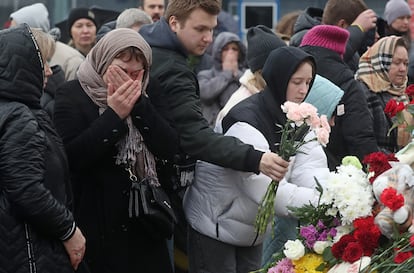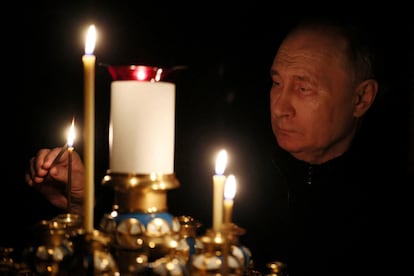The band that was going to play on the day of the Moscow attack: ‘There are no words that can revive or console people’
Rescue services found dozens of bodies in bathrooms and staircases after people tried to flee from the terrorists who opened fire inside the Crocus concert venue


All of Russia has been in deep mourning since last Friday. A band named Piknik was going to play that day at the Crocus City Hall concert venue, on the outskirts of Moscow, when a terrorist commando burst in, shooting at everyone in sight. At least 137 people were killed in an attack that U.S. intelligence services have attributed to Islamic State (ISIS), which later claimed the attack. Four suspects were arraigned late on Sunday and charged with terrorist acts. Russian President Vladimir Putin has claimed the suspects were planning to flee to Ukraine.
On Sunday, band leader Edmund Shklyarsky, visibly moved, addressed the families of the victims and everyone who was there for their concert: “I offer you my condolences, but there are no words that can revive or console people,” he said twice. His manager’s assistant, Yekaterina Kushner, was one of the victims of the attack.
The attack began on Friday about 10 minutes before the scheduled start time of the concert, at 8:00 p.m. local time. Kushner, unlike the rest of the band’s team, was on the stage. Her colleagues lost contact with her after the attack.
“Katia is my friend, she is very close to me. I have worked with her for many years with both bands, Melnitsa and Piknik. We are not ready to believe the worst; Katia is a very strong and fighting person,” the band’s director, Yuri Chernyshevsky, wrote on Saturday on his social media accounts. But on Sunday the bad news was confirmed when her husband identified the body.
The other band members were saved because they were inside their dressing room, far from the massacre perpetrated by terrorists who slit the throats of some of the wounded and executed others with firearms.
Authorities are slowly identifying the victims. It took more than a day for the emergency services to extinguish the fire caused by the attackers, who used gasoline canisters to cause explosions that ignited the building. The concert complex was heavily damaged. More than 700 members of the rescue teams continued on Monday to remove debris from the site. The bodies of 28 more people who died trying to flee were found in the bathrooms; another 14 bodies were located in the emergency stairs.

The identities of some of the victims have started to emerge. One of them was Yekaterina Volosilova. Proclaimed Miss Tver in 2001, after one of the regions adjacent to the province of Moscow, she died in the attack at the age of 42. Married with two children, her close circle told the newspaper Starhit that “she loved Piknik very much and tried never to miss a concert.”
The tragedy also hit a well-known non-profit organization that helps search for missing people. The NGO Liza Alert issued a statement reporting the death of two of its volunteers, Oleg Pavlovski and Tatiana Abdulova. “The pain has also reached us, we have lost two friends and comrades,” said the organization.
Another victim was a senior official of the Russian central bank. Tatiana Pijnovskaya had gone to the concert with a childhood friend. Her husband could not come due to scheduling problems. According to Russian media, the victim was in the bathroom when the attack began and she was able to talk to her husband on the phone. He advised her to flee, but the two women died of suffocation from the smoke.
The tragedy has reached many regions of Russia. Alexei Rudnitsk was a 39-year-old ice hockey player from Yaroslavl, a location about 155 miles (250 km) northwest of Moscow. A woman from Tula province, about 93 miles (150 km) south of Moscow, was also among the dead, and her 11-year-old daughter has been hospitalized in Moscow in serious condition.
No mourning protocol
There is no protocol for declaring a day of mourning in Russia. This decision rests with the president, although tradition mandates that those killed in a tragedy with more than 60 deaths, or people of particular public relevance, should be honored in this way. However, with Vladimir Putin this recognition is a matter of personal sympathies: for Mikhail Gorbachev, the Russian leader who democratized the Soviet Union, there was no day of mourning for his death in 2022. But there was one in 2007 for former president Boris Yeltsin, the man who handed over power to Putin, despite being pointed out as one of the main culprits of the calamitous 1990s.
The last time Russia was in mourning was in 2018. On March 25 of that year, 64 people died when a shopping center in Kemerovo, a Siberian city located 2,100 miles from Moscow, burned down.
On Sunday, Russians continued to approach Crocus City Hall to honor the victims and support the survivors. A mountain of flowers, toys and candles commemorates the dead and injured just a few feet from the entrance of the concert venue, now crowned by a completely charred roof.
Moscow morgues remained packed with people. “We are trying to offer consolation, but it is difficult,” priest Mikhail told Fontanka newspaper on Sunday. “People are coming in droves, many people have died. It is a terrible pain.”
Sign up for our weekly newsletter to get more English-language news coverage from EL PAÍS USA Edition
Tu suscripción se está usando en otro dispositivo
¿Quieres añadir otro usuario a tu suscripción?
Si continúas leyendo en este dispositivo, no se podrá leer en el otro.
FlechaTu suscripción se está usando en otro dispositivo y solo puedes acceder a EL PAÍS desde un dispositivo a la vez.
Si quieres compartir tu cuenta, cambia tu suscripción a la modalidad Premium, así podrás añadir otro usuario. Cada uno accederá con su propia cuenta de email, lo que os permitirá personalizar vuestra experiencia en EL PAÍS.
¿Tienes una suscripción de empresa? Accede aquí para contratar más cuentas.
En el caso de no saber quién está usando tu cuenta, te recomendamos cambiar tu contraseña aquí.
Si decides continuar compartiendo tu cuenta, este mensaje se mostrará en tu dispositivo y en el de la otra persona que está usando tu cuenta de forma indefinida, afectando a tu experiencia de lectura. Puedes consultar aquí los términos y condiciones de la suscripción digital.








































